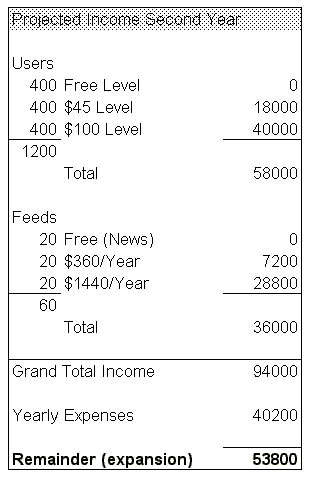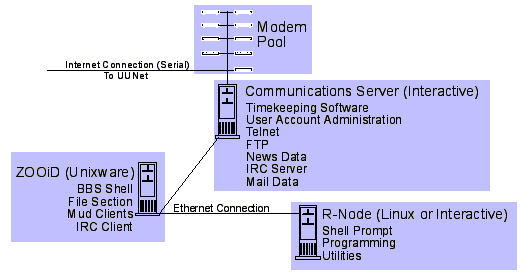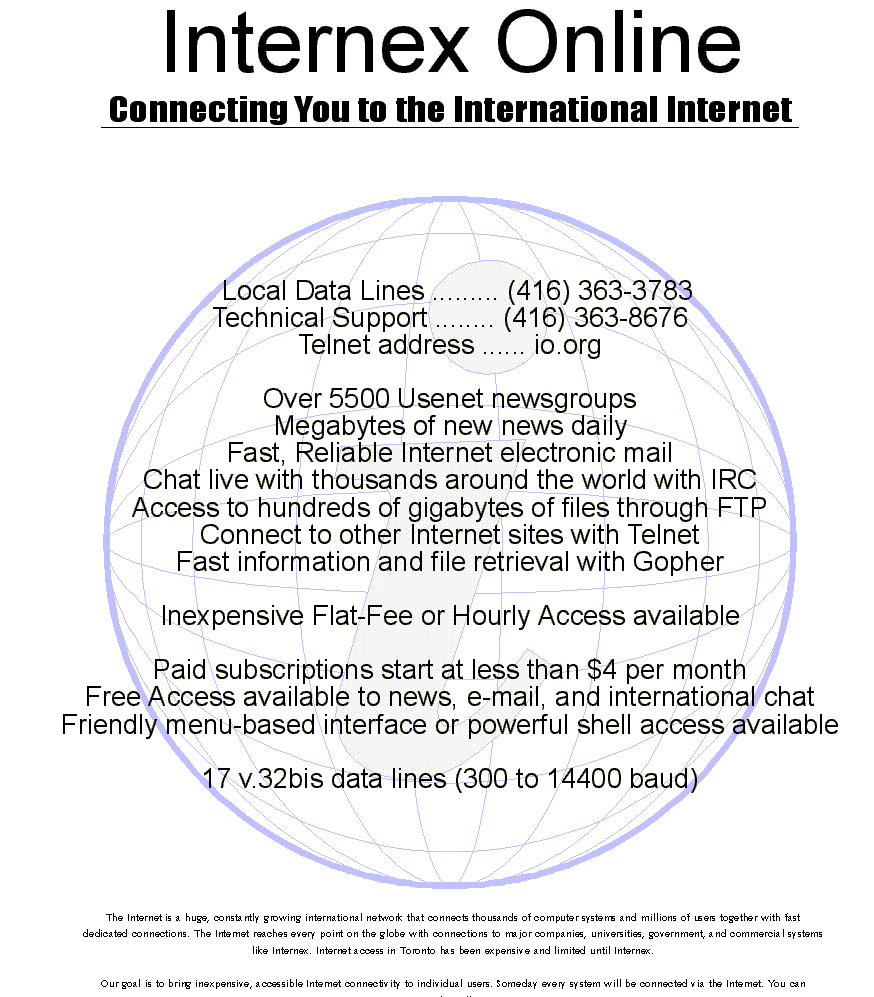A Brief history of Internex Online (io.org)

Forward: Internex Online (io.org) was
considered "Canada's first Internet access provider for
Individuals." It was a community-centered system with a strong
personality, started in 1993, and grew to about 10,000 users in
1995.
By: David Mason, ca 1995.
From my perspective, IO was an extension of the original ZOOiD
BBS. ZOOiD was originally a Commodore 64 dial-up bulletin board
system, started in 1987 after being involved on a few other systems. Bulletin
board systems tended to be more
narrow in focus, and most didn't offer any non-local capability at
all. Instead, people participated via discussion in the local
newsgroups, or private email to local users; usually there were a
few dozen to a few hundred people on each system. On ZOOiD,
especially in the early days, the overall style was irreverant,
humourous, and strange; definitely a disillusioned but intelligent
crowd that wanted to communicate.
As time went by, ZOOiD continued to grow. After a number of
years, it went briefly to a DOS system, attempts at Minix, and then
a Xenix based system. Though ZOOiD was a hobby, myself and the
entire user population were increasingly using the information
available from sources like Usenet and the UUCP mail system;
largely because of the influence of people like Marc Moorcroft
(Smarasderagd).
We participated in the local UUCP mail and newsgroups
proliferation, which offered our members email to Australia faster
than the post office could deliver it! The system would call the
various UUCP points every few hours to deliver and recieve mail and
news; a permanent connection was almost unheard of in those days
except for universities or research companies.
On ZOOiD, the Internet email and newsgroups proved very popular,
and also attracted a new group of people, just out of university or
otherwise informed about the internet, who needed net access; it
was very difficult come by otherwise. As a hobby system ZOOiD was
running on a cost basis, while providing free access. To new
members, the community meant little, though many chose to join in
and contributed to the community immensely.
By 1993 we had four phone lines, at the request of Bell running
a pipe up to a third floor apartment to accomodate them. Modems
included the USR Dual Standard, Telebit T2500, and at one point
some see-through GVC modem. We had about 300 members.
At this time Lyn (Gaea), who later became a founder of IO,
started working for UUNET Canada, as their second employee. We met
Marc (Scrappy) of R-Node, the final founder. He was running another
unix-based system at the time, this one more oriented towards
access through the shell prompt than the BBS-esque ZOOiD. We were
exchanging mail and newsgroups, and started getting together for
dinner and informal meetings. We were all strongly interested in
the capabilities and community of the net and of course we dreamed
of quitting our 9-5 jobs to do nothing but net stuff.
The Internet was picking up some momentum in the popular sphere,
but it was very home-grown and more based on impressions of BBSs or
CB-Radio. (Months later, after Internex was started, I was
interviewed by a CBC news broadcast doing a story on William Gibson
and "cyberpunk"; they felt compelled to describe the internet as a
"global party line".)
At this time, the government announced an initiative to develop
internet growth in the province, called ONIP, which our group heard
about. Marc, Lyn and myself put together a proposal to provide
low-cost Internet access to organizations, mainly educational,
government and non-profit. My motivation came from my job at a
"non-profit," seeing the potential of the Internet and how it was
not generally available to organizations and individuals. Dial-up
access from local non-profit or commercial providers was barely
less than The Phone Company's corporate service, which charged by
the kilobyte for access to email (TPC's support person: "The
Internet? That's our competition").
Unfortunately, ONIP's agenda at the time seemed to be to foster
"Free-Nets", and our proposal was too wacky for them. We were
initially asking for $8,000, a figure that we thought would be
adequate to get the project off the ground. (Just to reiterate, we
really were early-20s hicks of the time, and hackers as well, not
at all into big-business industry, just seeing something that would
be cool to do, without having any idea we were supposed to impress
anyone. We thought the low figure wouild make our project seem
worthwhile, I'm sure we were backward now).
Our request was turned down but we continued to consider the
idea. We talked to uunet.ca and got the go-ahead to access their
Internet connection at a fixed rate by occupying space in the same
building; 1 Yonge Street. One Yonge Street was the Internex (and
UUNet) office in the Toronto Star building; Internex itself was in
a very small office above UUNet, who'd recently taken their own
floor. We decided to set up shop with what hardware, skills and
funds we had.
 After considering the names
Conexus and TH Inc, Internex Online was incorporated on May 27,
1993. It was designed with a dual theme, on the ZOOiD side the
easier to use integrated shell, on the R-Node side the more
powerful unix shell. The significant thing was that it had a
permanent, dedicated Internet connection.
After considering the names
Conexus and TH Inc, Internex Online was incorporated on May 27,
1993. It was designed with a dual theme, on the ZOOiD side the
easier to use integrated shell, on the R-Node side the more
powerful unix shell. The significant thing was that it had a
permanent, dedicated Internet connection.
It's significant to note that while the public was aware of the
Internet, and we expected reasonable growth, there was no real
internet "boom" of the time. It was really not much more than an
offspring of the BBS scene. We thought we might expand to 3000
users by the third year, much of the access provided completely
free, with much of our job involved in participation in the
internet in general, for example maintaining feeds with other
servers, file repositories, etc. We expected our users would be of
the same type we had encountered, mainly technical people or those
interested in the net for a specific reason, like research or
communicating via email.
From the early days, we had no thoughts of "cashing in," late
1990s net style, but instead thought of [eventually] making decent
salaries doing what we wanted to do; run a big Internet BBS for a
community, as well as participate in the growing
inter-organizational scene on the net. We wanted to have more
community and participation than the other services of the time,
which we saw as spiritless.
 The early days were excellent times. We
were working together as an effective team and were very positive.
The users were a close community and were participating in the
system. We felt really driven to set the system up, and we
literally threw everything we had into it.
The early days were excellent times. We
were working together as an effective team and were very positive.
The users were a close community and were participating in the
system. We felt really driven to set the system up, and we
literally threw everything we had into it.
 At the same time, there were
many system problems, because of our lack of time, experience, and
the primitive systems we were using.
At the same time, there were
many system problems, because of our lack of time, experience, and
the primitive systems we were using.
Access in general was completely unreliable. Because of our
limited resources, we had to build our systems with everything
interdependant on everything else. considered unreliable with the
DX-2/50. We were using Unixware because it had support for the
multiport board we had (about a year earlier I was quoted right
after Scott McNealy in Unixworld magazine for the quote that
Unixware stood for "Unix - where?").
 Yet, the system was expanding, and because we
were the only system to economically offer true internet access,
and because most of the users were technical and understood how
prototypical everything was, we did well. We took to advertising in
places like eye magazine to get the message out.
Yet, the system was expanding, and because we
were the only system to economically offer true internet access,
and because most of the users were technical and understood how
prototypical everything was, we did well. We took to advertising in
places like eye magazine to get the message out.
I have a collection of early-days io memorabilia.
Here is Internex's statement
to the National Science Foundation,
to gain official access to the backbone of the Net at the time,
from November 1993.
Internex agrees to abide by the NSF acceptable use
policies. We agree to be responsible for the education of our users
on the proper and acceptable use of NSF Net and we will ensure that
no abuses occur.
Internex is a public access Internet site which provides free
and low cost Internet access to many people from all walks of life.
Our reason for existance is to make affordable access to the
Internet available to people requiring it, in a responsible way.
Among our clients we have many educators, researchers,
professionals, students and others who use our service to maintain
connections with others around the world and access worldwide
resources. We have many examples of persons from these fields who
depend on our services for access to worldwide colleagues or
resources.
We also participate in the spread of information by providing
openly available access to system resources. We plan to make our
system available for the use of other non profit and research
organizations. We provide system resources to developers who are
working on Internet dependant applications in the realms of
communications and connectivity.
For the first few months, I was the only full-time worker, and
others could only work on weekends or after hours. Along with much
of the setup, I was doing customer services, business stuff, and so
on... Among other events, I remember things like three days of
non-sleep starting December 24 1993, reinstalling the main server
after a crash, along with daily emergencies trying to keep the
feeble hardware operating and the often barely tested software
running under ever increasing demand. For two very cold months the
system would crash every morning at 3am, and I would ride the Yonge
Street bus from Lawrence to the tiny office to reboot it.
We were also using Linux, due to dedication to cause and a lack
of choice, at a time when the networking code was completely
unsuitable for ISP use. Not to mention the fact that the modems and
many other pieces of hardware and software we were using were not
designed for our environment (Internex did not have any sort of
proper machine room until more than a year later; we had to open
all the stand-alone modems up and point a fan at them to keep them
running half reliably). We had to write much of the code to tie the
system together, and we almost always had to learn and experiment
as we went along.
Early on, because of of lack of time and focus, much of the
ZOOiD personality and ideas were put aside, and it simply became
the "iox shell." This was disappointing to me, but I was too busy
trying to keep things going. The system as a whole was gradually
getting better, we were able to hire Emily as our first salaried
employee, and by the time Marc was able to quit his job and work
full-time on the system, it was starting to become more reliable,
with days at a time of solid uptime. To accomodate this, the prices
went from starting points based on the Usenet-BBS level of $45 per
year, ever upwards, and the free access, originally meant to be
fully useful for basic 'net use, was trimmed to "evaluation" levels
(with free time provided during non-peak hours).
Even though competitors were starting to appear, and io was
starting to hit hard cold realities, it was still unique. The
community was still growing, with many people meeting in
newsgroups, online chat and elsewhere. People continued to make
meaningful, long-term connections, and their horizons expanded.
Often because of the age of many people (high school or
university), but mainly because of the opportunities and
connections available in the online world.
Some of my favorite memories are from IRC in the early days; the
community, openness, intelligence and humour I could find there was
a good representation of what the net had to offer (it was also fun
to poke fun at the really obnoxious IRC denizens - before they
became overwhelming). During that summer, there were some great
parties and get togethers and lots of amazing projects going on.
Many of the people I met have had a strong impact on me. Eek a
Geek, which was probably doomed from the start, was the greatest
internet cafe ever. Generally it was incredibly interesting to see
my own "hobby" and interests suddenly become the focal point of so
much public interest, and meet so many people who also had some of
the same interests. But overall, what was most important was that
we met many interesting new people during this time, and new
possibilties were always opening up.
And then, the real internet boom started happening, with more
frequent mention of the net in media and solid demand for services.
Internex was taking on hundreds and then thousands of customers,
and we were trying to keep up with demand, but the original
"vision" of the system was almost completely lost as everyone
concentrated on trying to make things go. The free access was made
useless.
I started getting interested in the other things that were
happening on the net, as well as analysis of the ISP business. I
found I wasn't able to communicate what I was seeing to others
involved in the company. Marc seemed uninterested in anything
outside of the day to day technical details of the operation, Lyn
was busy with her job at UUNet. Because I was spending more time
working from home (due to the cramped office conditions) on
business development and general admin (along with business dev and
some customer service, I was writing the accounting system at the
time) I became less connected to what was going on at the system.
My attempts to keep things moving forward, to push for business
practices, analysis, and so on, were ignored, and I seemed more and
more to be coming from the outside. Email that I sent to discuss
these issues was disregarded and meetings I tried to call were
skipped.
On the system, the quirky and aware tone was being replaced by
meaningless business-speak. The original emphasis of being a very
personal news, mail, shell and chat oriented system with a
community was becoming simply a provider of network services; the
less Internex could promise the better, to protect itself. Even so,
the system was unable to expand quickly enough to meet the new
demand. The original community was disillusioned with changes.
Fragmented cliques were formed and the direct contact between users
and admin all but disappeared. And as on almost all other services,
in the public forums the old community was overwhelmed by bickering
customers and retreated to IRC, MUDs, the world of commerce, and
other places.
Alternatives like interlog.com were now available, they
certainly learned from our mistakes... but there was ever more
demand for access. The word ISP had barely existed in 1993, but now
it had become big business. I found (once again) that I wasn't
interested in business. I started getting interested in the "other"
things that are happening on the internet. I was spending an
increasing amount of time checking out the net in general, in terms
of impact and technical possibilities. I had projects in mind that
didn't seem to fit into what Internex Online had become. I wasn't
able to communicate what I was seeing to others involved in the
company, and it wasn't going in the same direction as me. I met
someone who was interested in becoming involved with the Internex
of the time, and sold my shares and resigned as President in
September of 1994.
I lost interest in what went on afterwards. I felt I had tried
to steer the company in a way that was positive to me, but it
didn't work out, so I left. I had considered a number of options,
but I know I'm not a straight-ahead business person. I'd rather
seek out my own point of view and see if there are others like me,
which is why I was drawn to the net in the first place, and still
the thing I'm most interested in.
I enjoy the fact that our naitivitee and focus caused Toronto's
early internet access to be very inexpensive. This enabled many
people access who wouldn't otherwise had it; we were strongly in
opposition to systems of the time like Compuserve. Additionally, at
least to me, free access was always a big part of the system. Above
all the focus was to enable people to escape what is sometimes the
world of mundaneness to a more abstract place.
I'm glad that I met so many people, and was able to be part of
contributing access and the online experience to so many people.
I'm constantly amazed by how many of Toronto's early internet
adopters got their start on Internex. These days the internet seems
to be more about getting the customer to click on a "buy now"
button, I hope the early ideas of sharing information and time
carry through that to become a more significant factor. It is still
possible to speak to newcomers about these values and meanings,
which provides me with hope that the larger messages of the net are
not lost, and perhaps the connected intelligence it brings will
provide us with something more useful than more vapid
consumerism.
Notes:
Some old ZOOiD BBS material is archived at Marc Moorcroft's site
at http://pantransit.reptiles.org.
I lost a large and interesting collection of documents in 1994,
including the original less than serious Internex advertising.
Somewhere I think I have an old tape of ZOOiD just before it became
Internex, though I haven't had much luck finding it.
 After considering the names
Conexus and TH Inc, Internex Online was incorporated on May 27,
1993. It was designed with a dual theme, on the ZOOiD side the
easier to use integrated shell, on the R-Node side the more
powerful unix shell. The significant thing was that it had a
permanent, dedicated Internet connection.
After considering the names
Conexus and TH Inc, Internex Online was incorporated on May 27,
1993. It was designed with a dual theme, on the ZOOiD side the
easier to use integrated shell, on the R-Node side the more
powerful unix shell. The significant thing was that it had a
permanent, dedicated Internet connection.


